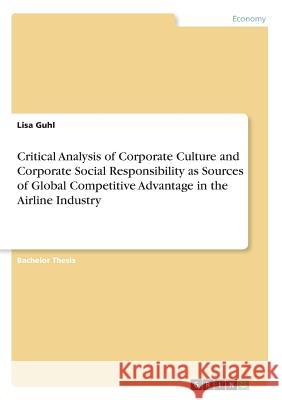Critical Analysis of Corporate Culture and Corporate Social Responsibility as Sources of Global Competitive Advantage in the Airline Industry » książka
Critical Analysis of Corporate Culture and Corporate Social Responsibility as Sources of Global Competitive Advantage in the Airline Industry
ISBN-13: 9783668334809 / Angielski / Miękka / 2016 / 84 str.
Critical Analysis of Corporate Culture and Corporate Social Responsibility as Sources of Global Competitive Advantage in the Airline Industry
ISBN-13: 9783668334809 / Angielski / Miękka / 2016 / 84 str.
(netto: 251,87 VAT: 5%)
Najniższa cena z 30 dni: 259,09
ok. 16-18 dni roboczych.
Darmowa dostawa!
Bachelor Thesis from the year 2015 in the subject Business economics - Business Management, Corporate Governance, grade: 1,5, University of applied sciences, Dusseldorf, language: English, abstract: Since globalization started companies have been looking for ways to compete successfully on a global scale. Trends in the global environment, such as worldwide sourcing models requiring the management of cultural differences, as well as rapid communication and technology innovation, are still challenging for many industries. The airline industry being itself a reason for an increasingly borderless world also faces these global trends and fierce competition. Numerous factors have caused a downward trend of profits in this industry. The first factor has been the deregulation process. Under regulation airlines could not compete on price. Therefore, differentiation was only possible by customer service or on-board entertainment. With the start of de-regulation most customers could not find much difference between the offerings of major airlines and became indifferent about which airline to choose. Airline tickets started to become a kind of commodity goods. So, although deregulation was thought to lead to lower entry barriers, decreasing concentration and competitive prices, practice turned out to be different: expansion and alliance strategies of leading airlines have increased concentration. Besides liberalization, other factors have been the economic slowdown in many countries, terrorism, and rising costs for fuel, labour, maintenance, and security. Also rising customer expectations e.g. regarding convenience, entertainment, innovation, and value for money require the airline industry to change dynamically. Moreover, airlines face demands for CSR and sustainable travel, including pollution control and reduction of noise and CO2 emissions. Competition from low-cost carriers also gains in importance since their share of global capacity increased to more than 25 % in











